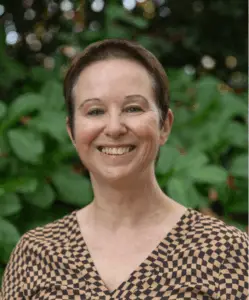
World Suicide Prevention Day
10th September 2025
It was World Suicide Prevention Day this week. Suicide is a topic of conversation that many of us feel uncomfortable discussing. It’s understandable because people worry that they might say the wrong thing.
My own experience of bereavement is that people often say nothing because they don’t know what to say. Suicide is something else though. How do you speak to a colleague, a friend, or an acquaintance who has lost someone to suicide? It is such a hard burden for those left behind to carry.
Some people consider suicide to be a selfish act or an act of weakness. It’s not. It’s a symptom of how badly a person is suffering.
Suicide doesn’t mean someone wants to die. It means they can’t see a way to keep living with the pain they’re in.
It’s the loneliest point a human being can reach — and it’s a conversation we all need to be part of.
In 2023, 6,069 people died by suicide in the UK. To put that in perspective: in the same year, 1,624 people were killed on our roads.
We talk openly about road safety. We run campaigns, create signs, and change laws to save lives. I live in Wales where we’ve reduced the speed limit to 20mph in many places. Everybody who lives there has had their driving speed impacted to save lives.
Isn’t it time we treated suicide prevention with the same urgency?
Mental health matters, and because of workplaces committing to mental health training we now get to have those important conversations together.
I know that mental health training can help reduce suicide. I have seen the difference that my own workplace training sessions have made. In fact, my first workplace client called me five years ago because they had had a cluster of suicides over a two-year time frame. We’ve had none since – which fills me with joy. Please believe me when I say we can make a difference.

The Ripple Effect…
Figures suggest that 133 people are affected in the aftermath of a completed suicide. It’s called The Ripple Effect.
If the worst happens and a colleague takes their own life, make sure you provide support immediately for your workforce.
People might tell you that they’re fine, but the truth is that suicide shakes everyone to the core. Be persistent and make support sessions available.
Expect that people will be shocked and some may feel guilty, worrying that they might have been able to prevent it had they been more vigilant.
Be particularly aware of colleagues who were close or who worked closely with the person and remember the ripple effect.
I provide ongoing support to the Mental Health First Aiders I train and have supported several of them who have experienced enormous levels of guilt following the suicide of a colleague. Guilt and blame are common emotions for those left behind.
In all of your mental health workshops raise awareness of the signs and symptoms, of mental ill health, and build a community so that everybody knows the signs to look for.
If a colleague has previously made an attempt at taking their own life, please ensure that you provide direct support to keep them safe.
Keep support in place for a good six months after the tragedy.
Check in more regularly on anybody who is not in work.
Remember to check in with family members who have lost a loved one to suicide.
Remember too that cluster suicides and copycat suicides do exist.
The most important conversation you may ever have…
In Mental Health First Aid training the module on suicide is usually the one that most trainees dread and, at the same time, it’s the one they most want to learn about. I find that my training as a therapist helps me navigate the sessions because invariably at least one trainee knows somebody who has taken their own life.
We all worry that should somebody confide in us that they are thinking of taking their own life, we would be out of our depth. That our replies might be inadequate and we might somehow be responsible if they go ahead and complete suicide. Let me reassure that this isn’t the case. In fact, it’s the opposite. Any conversation you have might save a life. It may be the most important conversation that you ever have.
There’s a myth is that we can put thoughts of suicide into another person’s mind. We can’t. It’s better to talk openly, to ask if they have had any suicidal thoughts and to offer to help them.
The Papyrus – Prevention of Young Suicide (under 35) – website has lots of useful information. They have a helpline and a template for a Safety Plan should you need to draw one up with the person who is struggling. This is all about sowing seeds of hope and helping them see that there is a way forward and that there are people they can call on. There is also a huge amount of useful information on the Samaritans website.
If somebody does confide that they are thinking of suicide, avoid reminding them of the people they would leave behind. We mean well when we say it, but it can come out like judgment and add further guilt to a situation where a person already feels overwhelmed.
I’m not sure if you know this but we no longer use the term “commit suicide”. The word commit is often associated with crime and suicide is not illegal in this country. It’s not a crime to feel unable to live with pain and suffering, it’s a tragedy but not a crime.
If you find yourself using the old terminology, try totally changing the phrase. Instead of saying “commit suicide” say “take their own life” instead. It can make you feel less self-conscious or worried about getting it wrong.
You may have noticed I said, “complete suicide”. Again, it’s a gentler way to say that somebody took their own life.
A final thought to leave you with …
Suicide is preventable until it’s completed.
Telephone numbers to keep handy
The Samaritans 116 123
Papyrus 0800 068 4141 or text 88247
Like a chat?
Sharing understanding of mental health, and resilience, in the workplace is vital. It makes employers stand out from their competitors and it helps individuals take responsibility for their own well-being.
If you would like to know more about how I provide workplace mental health and resilience support, or MHFA training, please drop me a line at carol@carolhickson.co.uk or call me on 07899806494.
Cheers everybody, and thank you for your time
Carol Hickson
